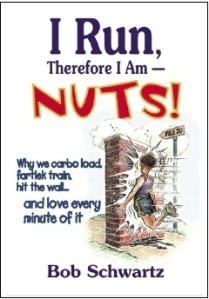 Is there any special method to your writing? When I'm writing a humorous essay for the books, I will obviously first think of the topic and then write a completely stream of consciousness piece, which will wind up having very little humor. It's almost embarrassing how brutally bad that first run through is and I go back and work through things word by word and cultivate the humor throughout. Sometimes it's painfully difficult to create the humor but, as with anything, some days you are flowing and some days you're stuck in mud. You've just got to keep plugging away.
Is there any special method to your writing? When I'm writing a humorous essay for the books, I will obviously first think of the topic and then write a completely stream of consciousness piece, which will wind up having very little humor. It's almost embarrassing how brutally bad that first run through is and I go back and work through things word by word and cultivate the humor throughout. Sometimes it's painfully difficult to create the humor but, as with anything, some days you are flowing and some days you're stuck in mud. You've just got to keep plugging away.
How many hours a day do you spend reading/writing? When I'm in the throes of writing a book, I will write anywhere from 4-8 hours per day. Given my genre of essay writing, most of my reading is in that area.
What inspires you to continue being a writer? As with running, writing is simply something that brings me much joy and satisfactions. There are certain abilities that come naturally to each of us and there's plenty of things I have zero aptitude for but I was blessed to have some ability with running and writing. I enjoy it immensely from a personal standpoint, just the act of creating, but I also enjoy the ability to bring some laughs to others who read my essays and books.
Do you think you will ever change audiences? Good question. The short answer is yes. I think that with my humorous running books, having two of them out now and including over 500 pages combined, that I've literally "run" the course with those books. I presently have many ideas in different genres. This includes children books as well as an inside look at the private foundation my wife Robin and I operate called the Here to Help Foundation. The Foundation assists those who have hit an economic hurdle and need some help moving forward. After our assistance they will have the ability to be self-sufficient. The inspirational stories that have emerged from the Foundation work are simply amazing.
What advice would you give anyone who wants to become a published author? As with anything, persistence is the key. It's not an easy thing in this day and age to become an author with a reputable publishing company. Sometimes you have to be a bit lucky, as I was, in creating a niche market (humorous running essays). Having a "platform" is what I kept hearing when I was pitching my initial humorous running book and I worked hard for many years in creating that platform via regional running magazines to national magazines etc. Eventually my publisher was willing to take a chance and it's worked out very well for both of us.
And do you have a list of favorite running books/authors? I enjoy the books of running philosopher of the late George Sheehan, anything by the exceptionally talented writer and former Olympic marathon runner Kenny Moore as well as the news and magazine writings of Scott Douglas.





